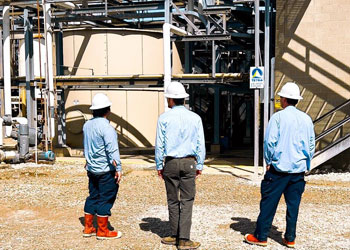Careers for the 21st Century: The TETRA Career Foundations Program
By Wayne Pekar | Global Director of HR, Talent Management | June 27th, 2024

Addressing Growing Energy Needs
Among the many constants in the modern world, providing energy and raw materials for industry are foundational. Steady population growth and the attendant rise in manufacturing and gross domestic product will continue to elevate demand for energy as well as the materials used in a wide range of industries. Last October, the US Energy Information Administration reported that by 2050 global electric-power generating capacity will likely increase by 50% to 100% and the generation of electricity will rise 30% to 76%. These trends are driven largely by the industrial and residential sectors. [1]
To help meet the energy and industrial needs of the twenty-first century, TETRA serves three major markets: Energy Services, Industrial Chemicals, and, more recently, Critical Minerals, the latter entailing production of bromine and lithium. TETRA is also growing, and we understand that serving these markets requires the ability to attract, develop and retain talented employees; individuals seeking a career path where they want to lead, thrive on tackling challenges, and are great at solving problems, all while meeting various needs of our customers.
TETRA Career Foundations Program
For that purpose, TETRA set up its Career Foundation Program, a leadership development sequence designed to provide exposure across the Company through various rotations while building participants’ business acumen and operational knowledge. The training program runs approximately 18 months and consists of three field-based job rotations of roughly six months each and two corporate rotations ranging from three to four weeks each. Field rotations may be at any of our US domestic operations in Arkansas, California, Louisiana, Oklahoma, Pennsylvania, Texas, or West Virginia.
The program has two tracks. One is the energy services track, which takes participants across our water management and production testing regions like the Permian Basin, Mid-Continent, and Appalachia. The other is the chemicals and completion fluids track, which provides exposure to operations from California to Parkersburg (West Virginia), West Memphis (Arkansas), Lake Charles (Louisiana), and the Gulf Coast, including time with the Technology Innovation Group at our laboratory in Conroe, Texas. Field rotations enable participants to gain exposure to our operations while learning from experienced employees what no textbook could ever provide.
Hands-on Experience

The Career Foundation Program provides hands-on, real-world experience. In addition, to building an operations foundation, participants are tasked with leading two projects consecutively in their job rotations, each alongside an assigned project sponsor. These projects are meaningful, not merely academic, with participants providing feedback that will help potentially generate revenue, decrease expenditures, or improve operational efficiency. A project could be centered on a specific region, a process, a product, or a service, and will entail gathering data, analysis, interviewing various stakeholders, and formulating recommendations, while presenting observations and findings.
Field Rotation Schedule
At the three-month and six-month marks, participants return to corporate headquarters in The Woodlands and present their project findings directly to the Company’s executive team. In fact, meeting with the executives is a highlight of the program, and the month-long ‘mini-rotations’ at corporate also enable networking with colleagues in Finance, Human Resources, HSEQ, Supply Chain, Legal and other corporate support functions. This engagement allows participants to cultivate professional relationships and take note of career opportunities within the Company.

Following their initial ‘mini-rotation’ at corporate, participants embark on their second field rotation, this time going to a different place and gaining exposure to a different aspect of the business. Again, they are assigned a meaningful project, and again they return to corporate at the three- and six-month marks to apprise the executive team of their findings.
The third and final field rotation focuses on leadership. Participants tackle more supervisory tasks such as budgets, forecasts, personnel issues, and customer interactions. Additionally, throughout the program participants can attend various training offerings with both internal and external curriculums to help build and shape their leadership capabilities.
Career Foundation Program Eligibility

Who is eligible for the Career Foundation Program? TETRA considers recent university graduates who majored in some form of engineering, be it mechanical, electrical, chemical, petroleum, civil, environmental, or another. Applicants should know going in, too, that it’s not a cakewalk: The program is highly selective and requires a significant level of assertiveness and grit from candidates. For example, participants will be asked to work outdoors in various weather elements, they will also travel extensively and will reside in various locations over the duration of the program. But the rigors of selection and the skills training of the program are designed to deliver a tremendous return on one’s investment.
Ultimately, the TETRA Career Foundation Program provides comprehensive hands-on experiences that position participants for success with the goal of placement in a dynamic supervisory or leadership role. One could characterize the program as a path of endurance for a lifelong career that is meaningful and valuable to society.
Endnotes
[1] U.S. Energy Information Administration, International Energy Outlook 2023, with Projections to 2050, 11 October 2023.


